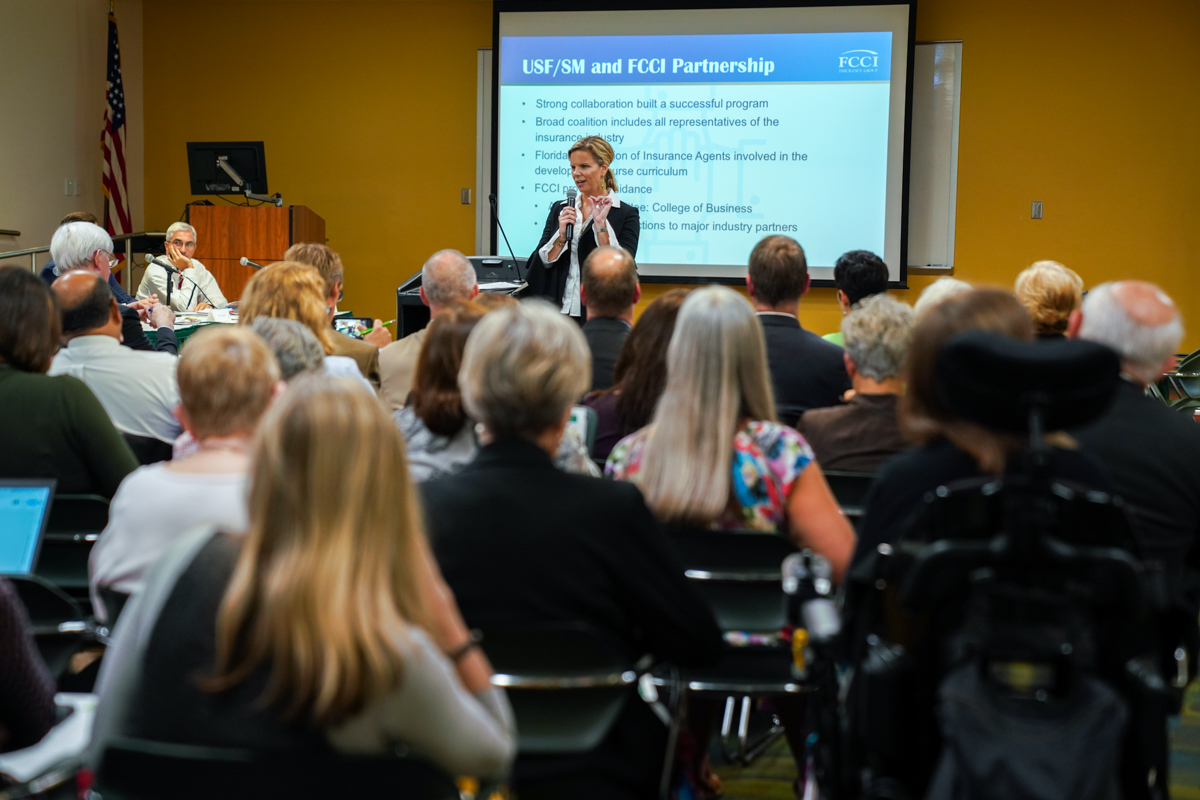The consolidation task force subcommittee met Thursday to discuss the future of academic programs on the USF St. Petersburg campus but left more questions than answers. Martha Rhine | The Crow’s Nest
By Nancy McCann
It was expected to be a forum where Regional Chancellor Martin Tadlock could finally pitch his vision for St. Petersburg’s role when the three campuses of the USF system merge into one in 2020.
But a lengthy meeting of a consolidation task force subcommittee on Thursday instead left more uncertainty about the future of academic programs at USF St. Petersburg.
Tadlock was not given an opportunity to deliver a presentation he had prepared on the vision he outlined in an email to USF St. Petersburg employees three days earlier.
Ralph Wilcox, the provost and executive vice president at USF Tampa, said that the needs of students are more important than “the delivery of academic programs in any particular location.”
And Rick Piccolo, president and CEO of the Sarasota-Bradenton International Airport and one of the three subcommittee members, said he was disappointed that he did not hear recommendations on research initiatives from the leaders of the three campuses.
By the time the three-hour meeting was over, half of the more than 100 people who had packed the room in Davis Hall had departed, and the president and CEO of the St. Petersburg Area Chamber of Commerce had voiced concerns about the pace of things.
“I don’t think we are having the real conversations (about consolidation specifics) yet,” said chamber leader Chris Steinocher. “We’ve got a clock that’s ticking.”
Since the St. Petersburg campus was granted independent accreditation in 2006, it has grown and thrived. When Florida legislators voted last spring to consolidate the three campuses, the campus and its allies in local government and business warned that St. Petersburg might be steamrolled in the consolidation process.
Huron Consulting Group, a Chicago-based firm that was hired to help plan for consolidation, proposed a reimagined USF system in September, with only one college of business and one college of education – both in Tampa.
The Kate Tiedemann College of Business on the St. Petersburg campus would become the Kate Tiedemann School of Finance and Entrepreneurship and the College of Education here would become a Department of Science and Math Education.
Huron visualized St. Petersburg having a College of Oceanography, Environmental Sciences and Sustainability. There would be a School of Art and Art History here under a College of Art and Design on the Tampa campus.
Both Tampa and St. Petersburg have a College of Arts and Sciences – duplication that is not fully addressed in Huron’s report.
Tadlock’s vision of USF St. Petersburg would put a College of Humanities, Arts and Sciences here. The campus also would have a College of Oceanography and Environmental Sustainability; a Kate Tiedemann School of Business; and a School of STEM Education and Innovation.
Steinocher told the subcommittee that “there are shortcomings in the Huron report” that need addressing before consolidation planning gets further along.
In an interview with The Crow’s Nest on Friday, Steinocher said he is concerned that there are still many questions that need to be answered.
“It really is about the details,” he said. “When it’s gray for so long, it creates uncertainty for many people.”
“I was confused,” he said. “I stayed for the entire meeting because I thought the two chancellors and the provost were going to talk in detail about their visions for the three campuses.
“I thought the drill was over and everyone would be given a chance to react to the Huron study. But there was no clarity.”
The 13-member consolidation task force and its three subcommittees, which have held several public hearings and meetings on the three campuses to listen to experts and residents, are part of the ballooning bureaucracy that was formed to plan for consolidation.
There are also five internal work groups, which Tadlock says have grown to a total of about 170 people.
Piccolo, the Sarasota-Bradenton airport leader, said in an interview Friday he thought it was important to have Tadlock, Wilcox, and Regional Chancellor Karen Holbrook from USF Sarasota-Manatee on a panel together at Thursday’s meeting.
“Up until that point, we had heard only from professors and department heads,” he said. “It’s been a difficult and very involved process with a steep learning curve and over 1,000 pages of documents to review.
“But I agree; I would like to see more of what the campuses want.”
State Sen. Jeff Brandes, R-St. Petersburg, said at Thursday’s meeting that “there are major gaps” to be addressed in the consolidation planning.
“The ability to make decisions must remain on the USF St. Pete campus, as defined by law,” he said.
Brandes supported the legislation that abolished St. Petersburg’s independent accreditation, contending in a Crow’s Nest interview last spring that he had long regarded USF St. Petersburg as a school without vision.
Tadlock says he will make his presentation and recommendations on college and school structure when the subcommittee meets again – in downtown Tampa on Nov. 6, which is Election Day.
The subcommittee’s recommendations are due to the consolidation task force on Nov. 29.
“We have always had a vision here,” said Tadlock in an interview on Saturday. “The way it works is that we provide the information that is asked of us at the task force meetings.”
Asked if he thought the consolidation planning was going well, he responded:
“It’s working about as well as you could expect.”



